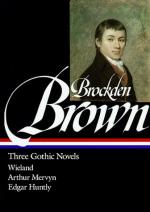|
This section contains 10,901 words (approx. 37 pages at 300 words per page) |

|
SOURCE: "The Gothic and the Revolutionary, " in The Early American Novel, Columbia University Press, 1907, pp. 29-58.
In the following essay, Loshe studies the Gothic elements of Brown 's novels, stressing the influence of William Godwin on Brown 's writing. Loshe maintains that, like Godwin, Brown incorporated into his novels elements that were both psychological—such as characters with abnormal powers—and revolutionary—such as the "dream of an ideal commonwealth beyond the sea."
The period of amiable amateurishness with which American fiction began, was followed by the popularity of the first really gifted American novel-writer, the first also whose name has won the adornment of tags in the handbooks of literary history—Charles Brockden Brown, variously known as "The First American Novelist, " "The Father of American Fiction," "The First American Man of Letters." Brown's novels, however, are separated from those of his predecessors less by professional handling or...
|
This section contains 10,901 words (approx. 37 pages at 300 words per page) |

|


